Emerging Leaders in Health and Medicine Scholars
Each year, NAM selects up to 10 early- and mid-career professionals with demonstrated leadership and exceptional professional achievement in biomedical science, population health, health care and related fields to serve 3-year terms as ELHM Scholars.
While continuing to work at their primary institution, the ELHM Scholars will participate in certain NAM activities, exchange ideas with each other and field leaders across sectors and disciplines, receive mentoring from NAM members, and help shape the ELHM Program. Participants also provide valuable input and feedback to help shape the priorities of the NAM and sustain the NAM’s impact and reputation as a national leader in advancing knowledge and accelerating progress in science, medicine, policy, and health equity. ELHM Scholars may publish Perspectives, participate in convening activities throughout the larger National Academies, and participate in interest groups.
Selection Criteria
Selection of ELHM Scholars is based on a variety of factors, including personal and professional achievement, demonstrated creativity and field leadership, and the need for diverse perspectives and geographical and institutional representation. Qualified candidates will:
Have completed a terminal degree (or have equivalent experience and knowledge) in a relevant profession or field of study
Be early- to mid-career (defined generally as 5-15 years following attainment of the primary professional degree)
Demonstrate significant professional accomplishment and exceptional leadership potential
Be a U.S. citizen or permanent resident at the time of the application
Nomination Process
Visit our online nomination portal and click the NAM and NASEM Login button to log in using your NAM single sign-on credentials. Complete the form by providing the candidate’s contact information, your own statement of support, and the name of another individual who will write a letter supporting the candidate. The candidate and reference writer will receive an automated email inviting them to complete their portion of the nomination. Each member may nominate up to three candidates.
Nominate a Scholar
Call for Nominations
NAM Members may nominate outstanding candidates from September 17-October 31, 2025.
Current Scholars
Optional description copy
Optional secondary heading
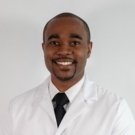
Adewole (Ade) Adamson, MD, MPP, is a dermatologist and assistant professor in the Department of Internal Medicine at Dell Medical School. His clinical interest is in caring for patients at high risk for melanoma of the skin, such as those with many moles or a personal and/or family history of melanoma. He is interested in how artificial intelligence can be leveraged to take care of this patient population.
His research involves understanding patterns of health care utilization including overuse and underuse. He is interested in how effectively and efficiently the health care system delivers care to patients with melanoma. He is passionate about health disparities, access to specialty care and costs. He speaks nationally about health care quality, value, and the application of evidence-based medicine within dermatology.
Adamson is a proud graduate of Morehouse College, receiving a Bachelor of Science in Biology and French. He earned a medical degree with honors at Harvard Medical School as part of the health sciences and technology program with the Massachusetts Institute of Technology. While in medical school he spent a year conducting research in immunology at the National Institutes of Health and later earned a Master in Public Policy at Harvard Kennedy School as a Zuckerman fellow in the Center for Public Leadership.
He completed his internship in internal medicine at The Mount Sinai Hospital followed by residency training in dermatology at the University of Texas Southwestern in Dallas. After graduation, he spent three years on faculty at the UNC at Chapel Hill.

AZA Allsop, MD, PhD, serves as an Assistant Professor in the Department of Psychiatry at Yale University School of Medicine and Affiliate Assistant Professor in the Department of Psychiatry and Behavioral Sciences at Howard University Hospital. With an academic foundation in Biology, Philosophy, and Jazz Studies from North Carolina Central University, AZA deepened his exploration into social neuroscience in the Tye lab at MIT as part of the Harvard Medical School-MIT MD-PhD program. At the core of AZA’s research is the quest to understand how the brain processes social information, and its consequential effects on cognition and behavior. He believes that uncovering these mechanisms has the potential to redefine mental health treatments and provide deeper insights into societal behaviors. AZA also delves into the roles of music, mindfulness, and psychedelics in influencing social bonds and stress resilience. Leading his independent research lab, AZA champions studies on the social brain and alternative healing avenues, with a specific emphasis on supporting underserved communities. He also plays a pivotal role as the Director of the Center for Collective Healing at Howard University. Throughout his career, AZA has seamlessly merged academic rigor with initiatives that have tangible societal benefits, consistently pushing the frontiers of neuroscience and deepening our grasp of human interconnectivity.

Bahal is an Associate Professor in the Department of Pharmaceutical Sciences at UConn. He earned his PhD from Carnegie Mellon (2012) and completed postdoctoral training at Yale University (2017), where he worked on a gene-targeting project to treat genetic disorders and cancer. His lab is developing new therapeutic modalities for targeting DNA and RNA at the intersection of nucleic acid chemistry and drug delivery technologies. Raman has published papers in prestigious journals, including Nature, Nature Communications, Cell Reports Medicine, Science Advances, and Molecular Therapy. He has received various grants, such as the St. Baldrick Foundation Research Scholar Grant, the Charles H. Hood Foundation Grant, the Cooley’s Anemia Foundation Research Scholar Award, and NIH grants. Bahal has received numerous emerging leader awards from esteemed societies like the RNA Society, NIPTE, OTS, AAPS, and AAUP. He was elected as a senior member of the National Academy of Inventors. He has delivered keynote talks at national and international conferences as well as for pharmaceutical companies. Bahal teaches professional and graduate courses and has received accolades for his teaching. His students have achieved various national and international honors and awards. Two of his graduate students won the UConn 3-minute thesis competition and represented UConn on the international stage. Bahal is also a co-founder of Zeal Therapeutics and actively participates in various outreach activities promoting STEM education.

Emily Bucholz, MD, PhD, MPH is an Assistant Professor of Pediatrics at the University of Colorado and a pediatric and fetal cardiologist at Children’s Hospital Colorado. Prior to joining faculty in Colorado, Dr. Bucholz graduated from Yale College with a BS in Biology and earned her MD, MPH, and PhD in Epidemiology at Yale School of Medicine and Yale School of Public Health. She completed her pediatrics residency and advanced training in pediatric cardiology and cardiac imaging at Boston Children’s Hospital and Harvard Medical School. Dr. Bucholz’s research investigates how social determinants of health and access to care impact healthcare utilization and outcomes in pediatric populations. Leveraging her extensive background in epidemiology and advanced biostatistics, she has developed and applied novel methods to measure and map health inequities in children with chronic conditions, particularly those with congenital heart disease. Dr. Bucholz’s work has been funded by federal and foundation grants from the National Heart, Lung, and Blood Institute (NHLBI), the Pediatric Heart Network, and the American Heart Association. Widely published in high impact medical journals, she has received several early-career and distinguished scientific contribution awards from the American College of Cardiology, American Heart Association, and Clinical Research Forum. Dr. Bucholz also serves as Principal Investigator on a UM1 grant through the Pediatric Heart Network, chairing committees in data science and social determinants of health, and as Associate Editor for the Journal of the American College of Cardiology.

Peter Croughan is an Internist with a background in health policy and state-level administration, currently pursuing certification in Addiction Medicine. He was born and raised in rural Cajun Louisiana before heading to Yale University, where I majored in History of Science and Medicine. He then worked in health policy research at PolicyLab at the Children’s Hospital of Philadelphia, before heading to UCSF for medical school, where I served as president of the student body. In 2017, Croughan took time away to work as Policy Director for Dr. Rebekah Gee and the Louisiana Department of Health, the state’s largest agency with over 5,600 employees and a $14 billion annual budget. There he spearheaded a statewide cancer strategy, analyzed state funding of graduate medical education, and developed the Hepatitis C subscription model. This new pharmaceutical payment model – the first in the US – allows unlimited access to Hep C medications, led to 12,425 cures to date, and serves as a model for the national elimination campaign launched this year. In 2018, Croughan assumed the role of Chief of Staff for the Department, where he was responsible for policy development, quality improvement, communications, external affairs, and legislative strategy. In 2020 Croughan returned to clinical practice at Massachusetts General Hospital, where he is completing Internal Medicine – Primary Care training.

Enrico Castillo is a community psychiatrist, health services researcher, and medical educator. He is the Medical Director for Clinical Innovations and Strategy in the San Francisco County Department of Public Health Behavioral Health Services. In this role he creates and implements new clinical programs, advises health system leaders, collaborates with frontline providers to improve existing services, and enhances data systems to support evaluation and continuous quality improvement. His leadership, research, and teaching centers on public service, community-government-academic partnerships, and improving the systems and programs that serve individuals with serious mental illness, especially in the areas of homelessness and incarceration. He serves in several national and state leadership roles in research and medical education, including the Mental Health Advisory Board of the Association of American Medical College, multiple roles within the American Psychiatric Association, Career Development Institute for Psychiatry, National Alliance to End Homelessness, and the California State Council on Criminal Justice and Behavioral Health. Dr. Castillo was previously an Associate Professor of Clinical Psychiatry at UCLA and is the co-editor of the forthcoming book, “Homelessness: A Clinical Guide for Providing Mental Health Care for People Experiencing Homelessness,” by American Psychiatric Association Publishing. He was a member of the second cohort (2021-2023) of the New Voices Program of the National Academies of Sciences, Engineering, and Medicine.

César de la Fuente is a Presidential Associate Professor at the University of Pennsylvania, where he leads the Machine Biology Group. He is one of the youngest tenured professors in the history of Penn Medicine. He completed postdoctoral research at the Massachusetts Institute of Technology (MIT) and earned a PhD from the University of British Columbia (UBC).
His research goal is to use the power of machines to accelerate discoveries in biology and medicine. Notably, he pioneered the development of the first computer-designed antibiotic with efficacy in animal models, demonstrating the application of AI for antibiotic discovery and helping launch this emerging field.
His lab is at the forefront of developing computational methods to mine the world’s biological information, leading to the identification of over a million new antimicrobial compounds. These efforts started by exploring the human proteome as a source of antibiotics for the first time. His team was also the first to find therapeutic molecules in extinct organisms, launching the field of molecular de-extinction. Molecular de-extinction has already yielded preclinical antibiotic candidates, such as neanderthalin, mammuthusin, and elephasin.
Furthermore, de la Fuente’s lab has broadened its antibiotic discovery initiatives to explore other branches of the tree of life beyond eukaryotes. By computationally analyzing microbial dark matter, his group has identified nearly one million new antibiotic molecules. These molecules have been made freely available and open access to the scientific community to encourage researchers worldwide to synthesize, characterize, and further develop them. This collaborative effort leveraged machine learning to explore the vast diversity of the microbial world by analyzing 63,410 metagenomes and 87,920 microbial genomes. Additionally, through the computational exploration of thousands of human microbiomes, de la Fuente and collaborators discovered a myriad of new antimicrobial agents, including prevotellin-2 produced by the gut microbe Prevotella copri.
Collectively, these efforts have dramatically accelerated antibiotic discovery, reducing the time required to identify preclinical candidates from years (longer than many PhD programs) to just a few hours. It is estimated that the work of de la Fuente and his collaborators have multiplied the speed of antibiotic discovery by a factor of 3.5 million, saving more than a million years of research and reducing what once took decades of collective work to just hours.
Additional advances from his lab include reprogramming venoms into antimicrobials, developing autonomous nanorobots to treat infections, creating novel resistance-proof antimicrobial materials, and inventing rapid, low-cost diagnostic devices for COVID-19 and other infections. Prof. de la Fuente is an NIH MIRA investigator and has received recognition and research funding from numerous organizations.
De la Fuente has received over 80 national and international awards. He is an elected Fellow of the American Institute for Medical and Biological Engineering (AIMBE), becoming one of the youngest ever to be inducted. He was recognized by MIT Technology Review as one of the world’s top innovators for “digitizing evolution to make better antibiotics.” He was selected as the inaugural recipient of the Langer Prize and as an ACS Kavli Emerging Leader in Chemistry, an ASM Distinguished Lecturer, Waksman Foundation Lecturer, and received the Miklós Bondanszky Award, AIChE’s 35 Under 35 Award, Society of Hispanic Professional Engineers Young Investigator Award, and the ACS Infectious Diseases Young Investigator Award. He also received the Thermo Fisher Award, as well as the EMBS Academic Early Career Achievement Award “For the pioneering development of novel antibiotics designed using principles from computation, engineering, and biology.”
Recently, Prof. de la Fuente has been awarded the prestigious Princess of Girona Prize, the ASM Award for Early Career Applied and Biotechnological Research, the ASM Award for Early Career Basic Research, the Rao Makineni Lectureship Award by the American Peptide Society, the Fleming Prize, and was selected as a National Academy of Medicine Emerging Leader in Health and Medicine. De la Fuente serves on the editorial boards of numerous scholarly journals and is currently an Associate Editor of Drug Resistance Updates (IF= 24.3; the premier international drug resistance journal), Nature Communications Biology, Bioactive Materials (IF = 18.9), Bioengineering & Translational Medicine, and Digital Discovery. He has been named a Highly Cited Researcher by Clarivate multiple times.
Prof. de la Fuente has given over 300 invited lectures, including numerous Keynote and Named Lectures, and has also spoken at TEDx. He has co-authored an influential book on machine learning for drug discovery, secured multiple patents, and published over 170 peer-reviewed papers in top-tier journals such as Cell, Science, Cell Host Microbe, Nature Biomedical Engineering, Nature Communications, PNAS, ACS Nano, Nature Chemical Biology, and Advanced Materials.

Anwesha Dey is a Senior Director and Distinguished Scientist in the Discovery Oncology Department at Genentech. Prior to this position, she held postdoctoral research fellowships in the laboratory of Vishva Dixit at Genentech and at the Institute of Molecular and Cell Biology (IMCB), A*STAR, Singapore in the laboratory of Sir David Lane. She obtained her PhD in the laboratory of Dr. Michael Summers at the Howard Hughes Medical Institute at UMBC, Maryland. Her scientific research at Genentech is focused on understanding the biology of Hippo and PI3K signaling pathways and how they can be targeted for cancer therapy. She has led drug discovery programs at Genentech and research from her lab has provided the foundation for developing first and best in class targets for therapeutic intervention. Dr. Dey has served as the co-chair of the AACR and FASEB meetings on the Hippo pathway — leading scientific meetings in the field. She serves on the Scientific Advisory Board (SAB) of the Keystone Symposia and is a recipient of the 2022 Genentech Women’s professional Emerging Leader Award, 2023 Changemaker of the year award at Genentech and 2023 Distinguished Alumni award recipient from University of Maryland. She is passionate about mentorship, Diversity, Equity, & Inclusion and a significant contributor to Genentech’s efforts in this area.

Joseph Dieleman, PhD, is Associate Professor of Health Metric Sciences at the University of Washington, Seattle. He also leads the Resource Tracking research team at the Institute for Health Metrics and Evaluation (IHME). This team has completed research focused on estimating healthcare spending by disease, tracking of development assistance for health and government health spending, projecting healthcare spending, and using novel methods to estimate healthcare value, cost of illness, and poverty rates at the subnational level. His projects are split between global research, seeking to understand financial flows for health in a wide variety of contexts, and US research, seeking to describe how healthcare is purchased. In both cases the goal is to provide information that is useful to policymakers and can contribute to improving health equity and outcomes, while maintaining or reducing inefficient spending. Dr. Dieleman received his PhD in Economics at the University of Washington.

Utibe R. Essien, MD, MPH is Assistant Professor of Medicine at the UCLA David Geffen School of Medicine and Associate Vice Chair of Equity, Diversity and Inclusion in the Department of Medicine. He is a general internist at the Greater Los Angeles VA where he teaches medical students and residents and provides medical care to hospitalized patients. Dr. Essien is a proud New Yorker, earning his BA from New York University and MD from the Albert Einstein College of Medicine in the Bronx. He trained in internal medicine at Massachusetts General Hospital (MGH) and Harvard Medical School. After residency he remained at MGH to complete an NIH-funded T32 general internal medicine research fellowship and received a Master of Public Health degree from the Harvard T.H. Chan School of Public Health.
Dr. Essien’s research focuses on detecting, understanding, and eliminating racial and ethnic disparities in the use of novel, evidence-based medications and technologies, particularly in the management of chronic cardiometabolic diseases such as atrial fibrillation. In 2021, he introduced the concept “pharmacoequity,” providing a new research and policy framework for achieving equitable access to life-saving therapies. He is an emerging leader in the field, as recognized by over 100 peer-reviewed publications and research grants from the Department of Veterans Affairs and the American Heart Association.
Dr. Essien’s leadership has earned him numerous awards including the 2023 Young Physician Scientist Award from the American Society for Clinical Investigation (ASCI), the 2024 Society of General Internal Medicine Outstanding Junior Investigator of the Year Award, and election as a Fellow of the American College of Physicians. His research and writing has been featured in several national news outlets including the New York Times, Washington Post, LA Times and NPR. He also serves as an Associate Editor for JAMA Network Open.
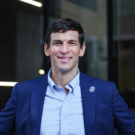
David Fajgenbaum, MD, MBA, MSc, is the Founding Director of the Center for Cytokine Storm Treatment & Laboratory at the University of Pennsylvania and one of the youngest faculty members to receive tenure in the history of the School of Medicine. Dr. Fajgenbaum is also the co-Founder & President of the Castleman Disease Collaborative Network, co-Founder & President of Every Cure, and national bestselling author of ‘Chasing My Cure: A Doctor’s Race to Turn Hope Into Action.‘ Dr. Fajgenbaum is also a patient battling a deadly disease which he discovered a repurposed treatment for that is saving his life and others. He has also advanced 18 other repurposed treatments for diseases they weren’t initially intended for. He recently co-founded Every Cure to unlock additional indications for FDA-approved medicines and is pioneering novel AI-driven approaches to enable this. In February 2024, ARPA-H awarded a $48.3M contract to advance Every Cure’s AI platform. Dr. Fajgenbaum also serves on the Board of Directors for the Reagan-Udall Foundation for the FDA.
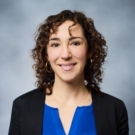
Elizabeth Cespedes Feliciano is a Research Scientist with the Division of Research, Kaiser Permanente Northern California. She is an emerging leader in the science of how energy balance influences the outcomes of chronic diseases. Her work integrates informatics with molecular epidemiology to understand how body composition influences progression and survival in cancer and aging.
Dr. Feliciano’s novel findings have helped to move the field beyond body mass index as a measure of obesity to establish the importance of muscle mass and adipose tissue distribution in multiple clinical conditions, including surgical outcomes, treatment toxicity, and cancer survival. Her research is supported by multiple grants from the National Institutes of Health and foundations.
Dr. Feliciano earned her master of science in social and behavioral health and her doctorate in nutrition and epidemiology from the Harvard TH Chan School of Public Health.

Arnab K. Ghosh, MD, MSc, MA is Assistant Professor of Medicine at Weill Cornell Medical College of Cornell University, where his research program focuses on climate change and health, and developing interventions to protect vulnerable populations against climate-amplified threats. His research emphasizes building equity-focused local and regional responses to climate-amplified threats, using quantitative and qualitative methods. His program is funded by the National Institutes of Health, National Science Foundation, Environmental Defense Fund, and several foundations. Dr. Ghosh served as a Climate and Health Scholar at the National Institutes of Health from 2023-2024, hosted by the National Institute on Aging. He is a fellow of the Atkinson Center for Sustainability and Center of Health Equity at Cornell University, a fellow at the CUNY Institute for Demographic Research, and serves as Emergency Management Fellow at Health + Hospitals, the largest county hospital system in the US. He also serves in several federal roles including as a Climate and Health Technical Advisor for the U.S. Department of Health and Human Services’ ASPR TRACIE program, and a Medical Officer as part of the Disaster Medical Assistant Teams within the National Disaster Medical System. He also chairs the national subcommittee of health policy and research at the Society of General Internal Medicine. Dr. Ghosh received his undergraduate medical degree and graduate degree in development studies at the University of Melbourne, Australia, and graduate degrees in health policy and economics, and clinical/translational sciences at Cornell University. He undertook his training in emergency medicine at the Royal Melbourne Hospital in Melbourne, Australia, and in Internal Medicine/Primary Care at New York University/Bellevue Hospital. Prior to his career in academia, Dr. Ghosh worked as a management consultant and an HIV/AIDS policy analyst at the United Nations Secretariat, and has practiced medicine in remote, resource-limited settings as an emergency physician.
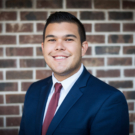
As a member of Alaska’s Metlakatla Indian Community (Tsimshian), Jerreed is dedicated to health research for North American Indigenous (Alaska Native, American Indian, First Nations, and Native Hawaiian) populations. Dr. Ivanich is an Assistant Professor at the Colorado School of Public Health, Centers for American Indian and Alaska Native Health, and an Adjunct Assistant Professor at the Johns Hopkins Bloomberg School of Public Health, Center for American Indian Health. His work meets at the intersections of prevention science, social network analysis, and adolescent health to reduce substance use and suicide in tribal communities. Through community-based participatory research, Dr. Ivanich aims to take the knowledge and strengths of tribal communities and put them in dialogue with the broader research field to improve public health and advance scientific methods.
When Dr. Ivanich is not working, he loves spending time with his wife and two amazing daughters. They all enjoy skiing together in beautiful Colorado. As a solo hobby, Dr. Ivanich recently picked up triathlon training and racing and loves that this allows him to connect to nature while exercising. The activity that fills his spiritual cup is volunteering to teach an early morning church seminary class to local high school sophomore students three days a week.

Forum Kamdar is an advanced heart failure physician-scientist focused on advancing the care of patients with neuromuscular cardiomyopathies through clinical and translational research. She is a tenure-track Assistant Professor in the Cardiovascular Division and Lillehei Heart Institute at the University of Minnesota. She has spearheaded a multi-faceted approach to address major gaps in care and knowledge of the increasingly prevalent cardiomyopathy associated with neuromuscular disorders. She helped to develop a novel interdisciplinary program in Neuromuscular Cardiomyopathy, including a multi-specialty clinic to screen and treat cardiovascular involvement in adult muscular dystrophy patients. This has reduced the barriers to care for neuromuscular patients and addressed a gap in the clinical cardiovascular care for patients that have been highly underrepresented in cardiovascular care. She leads a multi-center network funded by the Muscular Dystrophy Association to understand outcomes advanced heart failure therapies in neuromuscular cardiomyopathy. Additionally, she developed and validated a Duchenne muscular dystrophy (DMD) human stem cell cardiomyocyte model of Duchenne muscular dystrophy cardiomyopathy and identified major clinical gaps in care for patients with dystrophic cardiomyopathy. Her laboratory is elucidating fundamental mechanisms of DMD cardiomyopathy disease progression to identify novel therapies to ultimately treat DMD patients. Dr. Kamdar has received funding from national and international foundations as well as the federal government. For her outstanding contributions, Dr. Kamdar has received multiple awards including the American Society of Clinical Investigation Young Physician-Scientist Award, University of Minnesota Medical School Emerging Alumni Award, and American Heart Association Young Investigator Award.
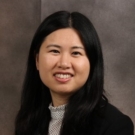
Lucinda Leung is an Assistant Professor of Medicine and Psychiatry at UCLA David Geffen School of Medicine. She is a general internal medicine physician at VA Greater Los Angeles Healthcare System, who teaches medical students and residents, as well as cares for hospitalized and clinic patients. Dr. Leung was a first-generation college student who earned her A.B. at Dartmouth College, M.D. at Brown Medical School, M.P.H. at Harvard School of Public Health, and Ph.D. at UCLA School of Public Health. She completed fellowship through the Robert Wood Johnson Foundation VA Clinical Scholars Program and was selected Chief Fellow for UCLA’s Specialty Training and Advanced Research Program. Dr. Leung is a board-certified Clinical Informatics subspecialist.
Dr. Leung’s expertise is in health services research to optimize care for primary care patients with mental health needs. Her work focuses on interdisciplinary team-based care models augmented by virtual care modalities. Poor mental health care access for her patients undermines her ability to successfully treat their medical conditions. Partnering with healthcare system leaders in the Veterans Health Administration and large health care organizations, Dr. Leung studies how to integrate mental health services into primary care practice (e.g., patient-centered medical home, collaborative care for depression, telemedicine), as well as its impact on care utilization, quality, and costs across populations, especially among safety-net patients. She and her research team employ wide-ranging methodologies (e.g., mixed methods research, implementation science cohort analyses, causal inference, pragmatic clinical trials) to understand how to redesign health services to help ensure the best outcomes at the highest value. She has been awarded more than 5 million dollars in federal funding (e.g., VA, National Institutes of Health), has published in leading peer-reviewed journals (e.g., Annals of Internal Medicine, JAMA series), and has provided expert consultation to federal and state agencies (e.g., Government Accountability Office). Dr. Leung was recognized with the VA Greater Los Angeles Healthcare System’s Research Impact Award in 2022 and with the Society of General Internal Medicine’s Excellence in Clinician Investigation in 2023, a top honor for early-career general internists in California/Hawaii.
Dr. Leung is supported by a VA Health Services Research & Development (HSR&D) Career Development Award to adapt and test primary care-based depression collaborative care models to increase uptake of effective digital mental health treatments for veterans. She recently obtained VA Merit funding to study potential disruption to depression care services during the COVID-19 pandemic, including downstream effects on psychiatric morbidity and mortality from suicide. Dr. Leung is also leading an NIH R01 that examines the effect of pandemic-related state policy changes surrounding telemedicine on patient-reported mental health care access, cost, symptoms, and functioning, with focus on Medicaid populations.

Cristian Lasagna-Reeves, is an associate professor at the Department of Neurology at Baylor College of Medicine. Dr. Lasagna-Reeves’s scientific career has revolved around the study of protein aggregation in neurodegenerative diseases. After completing his bachelor’s degree in engineering in Biotechnology and master’s degree in biological sciences, both from the University of Chile in Santiago Chile, he joined the Cell Biology PhD program at the University of Texas Medical Branch under the mentorship of Dr. Rakez Kayed. His main project focused on the relevance of tau oligomers in the pathogenesis of Alzheimer’s Disease (AD). His studies yielded evidence that this pre-filamentous form of tau is a possible biomarker and target for AD. He then joined Dr. Huda Zoghbi’s lab at Baylor College of Medicine for his postdoctoral studies. In her laboratory, he led a novel forward genetic screen to identify modulators of tau stability in human cells, and in a fly and mouse model of tauopathy. The main focus of the Lasagna-Reeves lab is to comprehensively elucidate the cellular and molecular mechanisms involved in the transition that the microtubule associated protein tau undergoes from its physiological function to aggregated toxic function in neurodegenerative tauopathies. Based on his academic portfolio, in 2023 he was awarded the Inge Grundke-Iqbal Award for Alzheimer’s Research by the Alzheimer’s Association and in 2024 the Rainwater Prize for Innovative Early-Career Scientist by the Rainwater Charitable Foundation.

Nathan Lo, MD PhD, is an Assistant Professor in the Division of Infectious Diseases and Geographic Medicine at Stanford University. He is an infectious diseases physician-scientist and epidemiologist. His research group studies the transmission of infectious diseases and the impact of public health interventions to inform policy aimed at controlling and eliminating these diseases. His research blends diverse computational methodologies, including tools from infectious disease epidemiology and mathematical modeling. Nathan’s interest spans across multiple infectious diseases, both domestically and internationally, with a focus on vaccine-preventable infections and neglected global infectious diseases. Nathan frequently collaborates with public health agencies, such as the California Department of Public Health and the World Health Organization. His research in infectious diseases has translated to public health policy changes in the fields of neglected parasitic diseases and COVID-19. He served as the lead writer for the WHO guidelines on control of schistosomiasis (2022) and strongyloidiasis (2024). He received a BS in Bioengineering from Rice University, and MD and PhD in Epidemiology from Stanford University. He completed a clinical residency in internal medicine at UCSF, with subspecialty training in infectious diseases. In 2022, he received a NIH New Innovator award.

Dr. Molly McNairy is an internationally recognized physician scientist with over 15 years’ experience as a front-line doctor and public health researcher in global epidemics and health systems research. She is an Associate Professor of Medicine at Weill Cornell in the Center for Global Health and Division of General Internal Medicine and Chief of Hospital Medicine at New York Presbyterian Hospital in New York City. She directs the Weill Cornell Global Health Research Fellowship. She graduated from the University of North Carolina as a Morehead Scholar and received her medical doctorate from Harvard Medical School, with training at the Brigham and Women’s Hospital in Boston. During her medical training, she received a Fulbright Scholarship to study health economics and policy at the London School of Economics and the London School of Tropical Medicine. Her research focuses on understanding modifiable poverty-related drivers of HIV and cardiovascular disease and applying this data to design targeted interventions for prevention and treatment. Her work includes epidemiologic cohort studies, clinical trials, and implementation science. She has been funded by the NIH (NIAID, NHLBI, Fogarty), CDC, and numerous other foundations. She has served as a technical advisor to Ministries of Health, WHO and CDC. She has received awards for her leadership and mentorship track-record, with a focus on women physician scientists. She lives in New York City with her husband and three children ages 6, 9 and 12.

Diana Montoya-Williams, M.D., M.S.H.P. is an attending neonatologist at the Children’s Hospital of Philadelphia, an Assistant Professor of Pediatrics in the University of Pennsylvania’s Perelman School of Medicine, a principal investigator in CHOP’s PolicyLab and Penn’s Population Science Center, and a senior fellow at the Penn Leonard Davis Institute of Health Economics. Dr. Montoya-Williams identifies as a first-generation bicultural bilingual Latina mother from Colombia, identities which deeply inform her clinical practice and academic contributions. She is currently supported by a K23 award from the National Institutes of Child Health and Human Development. Montoya-Williams leads multiple multidisciplinary inter-institutional research teams that use a variety of methodologies–from epidemiologic to qualitative–to answer research questions about why maternal and infant health disparities exist in the US and what healthcare systems and academic institutions can do to close gaps. Her work documents how structural racial and socioeconomic discrimination contribute to population health disparities, but also seeks to document structural forms of resilience to such discrimination. For instance, studies on paid family leave and sanctuary immigration policies show how state-level policies can mitigate the risk of poor birth outcomes and decreased healthcare utilization disproportionately experienced by marginalized pregnant people. Montoya-Williams also serves on and/or leads various diversity, equity, and inclusion committees for national multi-site clinical trials and cohort studies to promote equitable neonatal research practices. Finally, she is dedicated to evidence-based advocacy that advances child health. Her editorials have been featured in numerous scientific and news publications, including JAMA Pediatrics, Philadelphia Inquirer, Health Affairs Forefront, and The Conversation.

Dr. Erika Moore is an Assistant Professor in the Fischell Department of Bioengineering at the University of Maryland, College Park. She earned her Bachelor’s degree in Biomedical Engineering from Johns Hopkins University in 2013 and her Ph.D. in Biomedical Engineering from Duke University in 2018. As Principal Investigator of the Moore Lab, Dr. Moore develops biomaterial models that leverage the regenerative potential of macrophages to support tissue repair and regeneration. Her research addresses health inequities and focuses on topics such as age-related macrophage dysfunction, macrophage-driven inflammation in lupus, integrin-mediated interactions with the extracellular matrix, and the role of macrophages in uterine fibroids. Dr. Moore also advocates for professional development and financial literacy for students in STEM. In 2019, she founded Moore Wealth Inc., a nonprofit dedicated to teaching students key financial skills. Recognized as a 2020 Forbes 30 Under 30 honoree in Healthcare and a 2024 TED Fellow, Dr. Moore has received several prestigious honors, including the NIH R35 MIRA, the Lupus Research Alliance Career Development Award, the BMES Rita Schaffer Award, the 3M Non-Tenured Faculty Award, and the NSF CAREER Award.

Dr. Akinyemi Oni-Orisan (he/him/his) is an Assistant Professor at the University of California, San Francisco (UCSF). He is a licensed pharmacist with practice experience in Cardiac Intensive Care Unit, cardiac stepdown, and outpatient (advanced dyslipidemia clinic) settings. He has board certifications in applied pharmacology from the American Board of Clinical Pharmacology and in clinical lipidology from the Accreditation Council of Clinical Lipidology. The long-term research goal of Dr. Oni-Orisan’s lab is to improve pharmacological regimens for the prevention and treatment of cardiovascular disease in ancestrally diverse populations through precision medicine. To accomplish this objective, his group combines computational approaches in pharmacogenomics and pharmacoepidemiology using electronic health record-linked biorepositories. His lab is currently funded by the National Institutes of Health (NIH) to investigate genetic determinants of efficacy and safety for statin therapy in diverse populations. Dr. Oni-Orisan serves as Diversity Leader for the Department of Clinical Pharmacy to champion diversity, equity, inclusion, and anti-racism efforts in the department.
Dr. Oni-Orisan earned both his BS in biology (2006) and PharmD (2010) degrees at the University of Michigan. He received his PhD in Pharmaceutical Sciences (2015) from the Division of Pharmacotherapy and Experimental Therapeutics at the University of North Carolina. He completed a postdoctoral fellowship in the Clinical Pharmacology Training Program (2017) at UCSF. Dr. Oni-Orisan then joined the faculty at UCSF in 2017. He received mentored early career training in research through an NIH Career Development Award (2018-2023) from the National Heart, Lung, and Blood Institute (NHLBI).

Dr. Parr is an associate professor of medicine in the division of infectious diseases at the University of North Carolina at Chapel Hill. He is a practicing physician scientist whose research focuses on the molecular epidemiology of infectious diseases. He is broadly interested in applying cutting-edge molecular and genomic tools to solve problems faced by marginalized populations across the globe. Dr. Parr received his B.S. in chemistry from Stanford University, M.D. at the University of Virginia, and M.P.H. at Harvard. He completed residency in internal medicine at Brigham and Women’s Hospital, where he was selected for the Doris and Howard Hiatt Residency in Internal Medicine and Global Health Equity, and infectious disease fellowship at UNC. He is an elected member of the American Society for Clinical Investigation and a Fellow of the Infectious Diseases Society of America. Dr. Parr has collaborated with WHO on efforts to improve malaria diagnosis and treatment and previously served as an Associate Editor for Healthcare: The Journal of Delivery Science and Innovation. During the pandemic, he served as co-director of UNC infectious diseases’ inpatient COVID-19 services. As part of a highly collaborative research program, Dr. Parr leads translational projects focused on malaria in the Democratic Republic of Congo and Ethiopia, where he works closely with national programs to address emerging drug- and diagnostic-resistant parasite strains. He applies cross-cutting approaches to other infectious diseases, with applications including investigation of hepatitis B transmission patterns in Africa, design of new diagnostic tests, and use of genomic epidemiology to inform syphilis vaccine development.
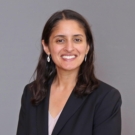
Anita Shukla is the Elaine I. Savage Professor of Engineering and core faculty member in the Center for Biomedical Engineering at Brown University. Professor Shukla’s research involves the development of nano- to macroscale responsive and targeted biomaterials for drug delivery, with a focus on treatment of bacterial and fungal infections. Professor Shukla is the recipient of several national and University honors and awards for both her research and teaching, including a National Academy of Engineering Grainger Grant (2021), Presidential Early Career Award for Scientists and Engineers (PECASE) (2019), a National Science Foundation (NSF) CAREER award (2020), an Office of Naval Research Director of Research Early Career Grant (2017), and a Brown University Early Career Research Achievement Award (2020) and Dean’s Award for Excellence in Teaching (2017). She has mentored 12 Ph.D. students, 7 postdoctoral researchers, 12 Sc.M. students, and more than 45 undergraduate researchers. Her dedication to research and mentorship were recognized twice by a student body selected Tau Beta Pi Research Excellence Award (Rhode Island Alpha Chapter, 2019 and 2022). Prior to joining Brown in 2013, Professor Shukla was a National Institutes of Health Ruth Kirschstein postdoctoral fellow in the Department of Bioengineering at Rice University. She received her Ph.D. in Chemical Engineering from the Massachusetts Institute of Technology (MIT) in 2011 as an NSF Graduate Research Fellow. Professor Shukla also received an M.S. in Chemical Engineering Practice from MIT. She received a B.S. at Carnegie Mellon University in 2006 with majors in chemical engineering and biomedical engineering.

Daniel J. Siegwart is a Professor in the Department of Biomedical Engineering, Department of Biochemistry, and the Simmons Comprehensive Cancer Center (SCCC) at the University of Texas Southwestern Medical Center. He holds the W. Ray Wallace Distinguished Chair in Molecular Oncology Research and serves as the Director of the Program in Genetic Drug Engineering, Director of the Drug Delivery Program in Biomedical Engineering, and Co-leader of the Chemistry and Cancer Program in the NCI-designated SCCC. He received a BS in Biochemistry from Lehigh University (2003), and a PhD in Chemistry from Carnegie Mellon University (2008), studying with Professor Krzysztof Matyjaszewski. He also studied as an NSF EAPSI Research Fellow at the University of Tokyo with Professor Kazunori Kataoka (2006). He then completed an NIH NSRA Postdoctoral Fellowship at MIT with Professor Daniel Anderson and Professor Robert Langer (2008-2012). Among various honors and awards, he has been elected to Controlled Release Society (CRS) College of Fellows and the American Institute for Medical and Biological Engineering (AIMBE) College of Fellows. His research laboratory utilizes materials chemistry to enable targeted nanoparticle delivery of genomic medicines. Their efforts led to an understanding of the essential physical and chemical properties of synthetic carriers required for therapeutic delivery of siRNA, miRNA, tRNA, pDNA, mRNA, and gene editors. His lab has been at the forefront in the design of synthetic carriers for gene editing, reporting the first example of non-viral in vivo CRISPR/Cas gene editing, and has applied these technologies for correction of genetic diseases and treatment of cancer. He also developed Selective ORgan Targeting (SORT) lipid nanoparticles (LNPs) for predictable tissue specific mRNA delivery and gene editing. Dr. Siegwart and his lab ultimately aspire to utilize chemistry and engineering to make a beneficial impact on human health.

Catherine Tcheandjieu, DVM, PhD, is Assistant Investigator at Gladstone Institutes and Assistant Professor in the Department of Epidemiology and Biostatistics at UC San Francisco since March, 2022. Born in Cameroon, her academic journey began with a Doctorate of Veterinary Medicine from the National School of Veterinary Medicine of Algiers, Algeria, followed by a master’s degree in Public Health and PhD in Genetic Epidemiology from the University of Paris-Saclay, France. She continued her training in genetic epidemiology through postdoctoral fellowships at Stanford University and Palo Alto Veterans Administration, focusing on the genetics of cardiovascular disease utilizing the VA Million Veterans Program (MVP) and the UK Biobank cohorts. With expertise in epidemiology, genomics, and statistics, her research aims to unravel the complex interplay between genetic and environmental factors, with a focus on population diversity, genetic and environmental variability. Her research is now supported by an American Heart Association (AHA) Second Century Early faculty Independence Award. Her impactful contributions to science include co-authoring of over 35 publications, many in leading journals, and mentoring graduate, undergraduate, and postdoctoral trainees, including those underrepresented in science, fostering an inclusive academic environment. Beyond her scientific pursuits, Dr. Tcheandjieu is an advocate for equity, inclusivity, and representation, championing diversity, inclusivity and representation in both the academic workforce and her research. She has received various awards, including the French Higher School of Public health’s graduate student Award, the Stanford Postdoc Justice, Equity, Diversity, and Inclusion Champion Award, the Stanford Jump Start Award, the MVP Early Career Investigator.
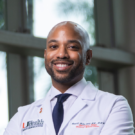
Hansel Tookes is a tenured Professor of Medicine at University of Miami Miller School of Medicine. He is founder of the IDEA Lab whose mission is to implement, disseminate, educate, and advocate for the health of people who use drugs. His lab also houses the IDEA syringe services program – the first legal program in Florida. Dr. Tookes spent five years advocating in the Florida Legislature for the creation of the program as an evidence-based HIV prevention intervention. In 2016, he succeeded and the pilot was signed into law. Today, Dr. Tookes serves as medical director of IDEA and successfully passed Infectious Disease Elimination Act of 2019 authorizing statewide expansion of syringe services programs. As a physician at Jackson Memorial, one of the largest public hospitals in the nation, Dr. Tookes attends on the HIV service as well as the Ryan White clinic. He is an advocate for health equity and has extensive experience working with both patients of low socioeconomic status and individuals who use drugs. His research interests include structural/systemic interventions and innovative approaches to HIV prevention and treatment. He is a 2021 recipient of a NIDA Avenir Award which is testing his innovative tele-harm reduction model for HIV treatment in a randomized controlled trial and, more recently, 3 NIDA R01s. The R01s include a trial of tele-harm reduction for the prevention of HIV, a team science cohort study, and an implementation science trial on opt-out HIV and hepatitis C testing for people who inject drugs. He has received numerous honors, including Miami Chamber of Commerce Healthcare Hero, Starbucks Upstander, and SAVE Champion of Equality. In 2023, he was appointed to the board of the HIV Medicine Association, the Presidential Advisory Council on HIV/AIDS and the CDC/HRSA Advisory Committee on HIV, Viral Hepatitis, and STD Prevention and Treatment.

Dr. Gichoya is a multidisciplinary researcher, trained as both an informatician and an interventional radiologist. She is an associate professor in the Department of Radiology and Imaging Sciences of the Emory University School of Medicine and is seconded to the NIH as a DATA scholar to support the flagship DSI-Africa program building data science capacity in Africa. Dr Gichoya has active memberships in many national informatics and radiology societies and committees, and serves on the Board of Directors for SIIM and HL7. She co-chairs the SIIM Research Committee and the Medical Imaging and Resource Center (MIDRC) Bias and Diversity Working Group. At Emory, she is a member of the Emory University Artificial Intelligence for Humanity Advisory Group that supports the provost in recruiting prominent AI scholars to Emory, building a community of AI researchers, and training Emory students for future AI -driven work. She also serves on the Emory Science Gallery Atlanta Advisory Board, one of seven galleries in the world that combines science, art, technology, and design to deliver world-class educational experiences for young people. She is a member of multiple editorial boards including PLOS Digital Health, New England Journal of Medicine (NEJM) AI journal, and Radiology AI journal. She is a member of external advisory boards for large AI projects at Stanford University and Cincinnati Children’s Hospital. Dr Gichoya’s research is centered around three themes: curating diverse datasets for medical imaging, evaluating fairness and bias in algorithms, and validating AI in the real-world setting. She was recognized by her peers in 2021 as the Aunt Minnie Most Influential Radiology Researcher.

Dr. Zhu is a practicing primary care physician and associate professor of medicine in the Division of General Internal Medicine at Oregon Health & Science University and core faculty at the Center for Health Systems Effectiveness. Dr. Zhu’s research focuses on health care access and quality, particularly for mental/behavioral health services, and on the effects of provider incentives and organization on health care delivery. In particular, she is interested in understanding how managed care plan features can be leveraged to improve behavioral health service delivery in Medicaid. A recipient of a K08 career development award from the National Institute of Mental Health, she is now principal investigator of multiple R01 grants as well as foundation grants. Her work has been published in high-impact journals, including JAMA, the New England Journal of Medicine, and Health Affairs; covered in media including The New York Times, Reuters, and The Wall Street Journal; and cited in government and legislative reports. Dr. Zhu obtained a BSc degree in global health and international development from Duke University, where she was awarded a Fulbright Fellowship. She received dual degrees in medicine and public policy from Harvard. After internal medicine residency training at the University of California, San Francisco, she was selected as a National Clinician Scholar at the University of Pennsylvania where she completed a two-year fellowship. She is a Fellow of the American College of Physicians (FACP) and serves on regional and national committees for the Society of General Internal Medicine, the American College of Physicians, and the National Academy of Medicine.
Alumni
An asterisk (*) denotes election to membership of the NAM in the year listed.
